Paternal Initiation Into The Written World, Or Gender Stereotypes In Compulsory Readings In The Hungarian Primary School Curriculum
Main Article Content
Abstract
The compulsory literary works in the lower four grades of Hungarian primary education are usually recognized as emotionally moving and morally uplifting. However, their merits are questionable from the perspective of the gender roles they construct as ideals for their young readers, who are so impressionable at this young age. The novels in question – Kincskereső Kisködmön by the Hungarian writer Ferenc Móra, Bambi by Felix Salten, and Erich Kӓstner’s Emil and the Detectives and The two Lottis - are firmly positioned in the patriarchal canon of the early 20th century. The heroes are usually boys, while the girls, if there are any among the characters, prepare to be able to fulfill their future roles of taking care of the (physical or emotional) demands of boys/men. It seems that the only positive position for women is that of the mother who clings to her (boy-)child and sacrifices herself for him while her love often becomes a burden on the growing son when he strives for his (expected) independence. The girls/women who are interested in non-traditional female roles are presented as unfeminine, unnatural and unworthy of attention. These common themes in these literary works are dangerous as compulsory readings for young readers, who are still too immature to develop a critical stance towards these stereotypical views.

